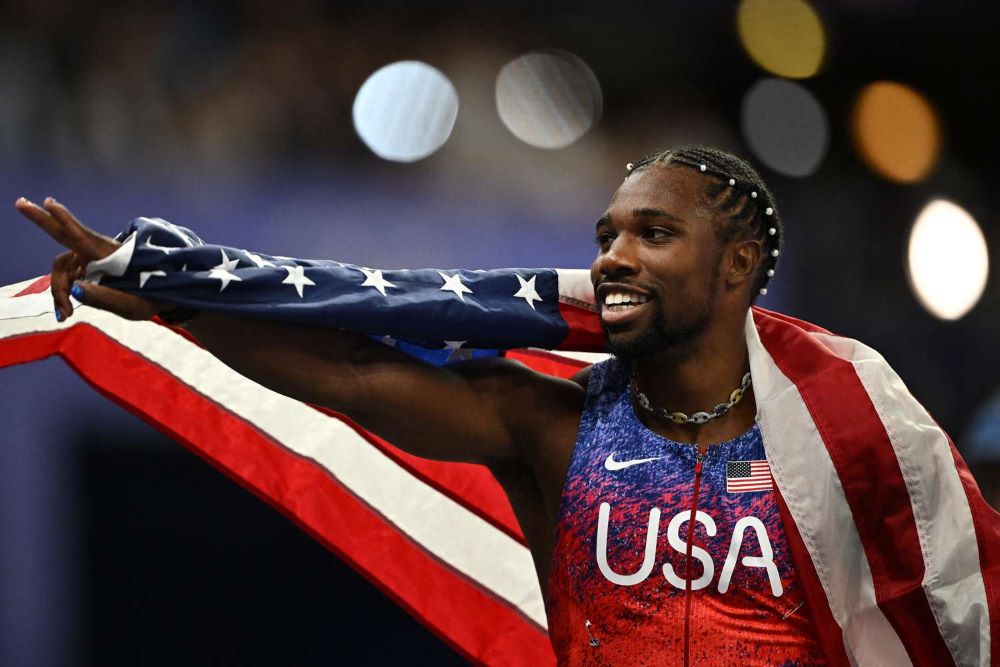Noah Lyles didn’t win his heat of the Olympic 100 metres. He didn’t win his semi-final either. He never led the 100 metres final until the moment his chest touched the line. But he is the Paris 2024 men’s 100 metres Olympic champion. And with victory we can acclaim him the world’s fastest man (until the next global championship).
On a glorious night in the Stade de France, Australia grabbed two medals with Nicola Olyslagers second in the high jump behind world record holder Yaroslava Mahuchikh and Eleanor Patterson sharing the bronze medal with Iryna Gerashchenko.
But it was the 100 which closed the night with a race of awesome depth. The eight finalists were held for what seemed like an eternity on the starting line, nerves jangling even faster than the jiggling of feet just itching to be off and running.
All eight men would break 10 seconds. Just 0.12 seconds covered them at the line. Lyles and silver medallist Kishane Thompson could not be separated to the hundredth of a second, both being given 9.79 seconds.
The photo-finish showed bronze medallist Fred Kerley’s foot was the first across the line. Maybe Thompson also got a foot in before the winner. But it’s the torso that matters and the more supple Lyles thrust his chest to the line five-thousandths of a second before the bigger torso of Thompson. If Kerley had been able to keep up with his leading foot, he would have won. Instead, he was third in 9.81.
For the benefit of future pub trivia nights, the two men who beat the Olympic champion at the Olympics were the Carl Lewis-coached Louie Hinchliffe in the heats and Oblique Seville in the semi-finals. Hinchcliffe went out in those semis while Seville was last, but not disgraced, in the final, finishing eighth in 9.91.
Embed from Getty Images
Lyles will now run the 200 metres – still widely considered to be his best distance – the 4×100 relay (for sure) and the 4×400 (he hopes). To be included in the latter he would have to push aside one who has ‘earned’ a spot on the relay through actually running the 400 at the US Trials. Historically, the Trials are sacrosanct when it comes to inclusion in relays (any event, actually). So, we shall see how that plays out.
Should he win the 200, Lyles will emulate Usain Bolt (and others) in becoming a 100-200 Olympic doubler. He already has done so at world championships level in Budapest last year. Should he get into both relays (problematic and, as far as I know, unprecedented) and the USA wins both (problematic) he will match the single-Games gold medal tally of legends Lewis and Jesse Owens – though we pedants will point out that three of the Owens-Lewis four were individual events.
When Julien Alfred won the women’s 100 the previous night, her path to the gold medal was cleared somewhat by the absence of defending Rio and Tokyo double gold medallist Elaine Thompson-Herah, Budapest double gold medallist Shericka Jackson (now also out of the 200) and Shelly-Ann Fraser-Pryce (delayed access to the warm-up track).
As they say, you can only beat who’s there. Lyles inevitably also has to beat someone who is not there. We speak, of course, of Usain St Leo Bolt. Lyles was nowhere near Bolt’s 100 world record of 9.58 seconds and not significantly closer to his three Olympic winning times of 9.69 (a world record then), 9.63 and 9.63.
He may yet get close to, or beat, Bolt’s 19.19 in the 200. But does it matter? Lyles is the best all-round sprinter right now, Bolt the best ever so far. AI may bring them together to race each other, but we will never see the real thing. Best just to enjoy the feats of both men – and all Olympic champions.
Mahuchikh set a world record in the Paris Diamond League meeting a couple of weeks before the Olympics. Competing in the older Charlety Stadium venue she cleared 2.10 metes to finally eclipse the 2.09 achieved by Stefka Kostadinova at the Rome 1987 world championships.
This night in the SdF, a modest by comparison clearance of 2.00 sufficed for the gold medal. Olyslagers cleared the same height but on her third attempt whereas Mahuchikh went over first time.
Six women cleared 1.95 but Patterson and Gerashchenko shared the bronze as each did so without a miss to that point while the other four – Vashti Cunningham, Christina Honsel, Elena Kulichenko and Safina Sadullayeva – had failures.
The result continued an extraordinary level of world dominance by the first four since Mariya Lasitskene won the gold medal in Tokyo. At those Games, Olyslagers was silver medallist, Gerashchenko and Patterson were fourth and fifth.
International politics has kept Lasitskene out since, but in Eugene at the following year’s world championships it was Patterson and Mahuchikh first and second, Gerashchenko and Olyslagers fourth and fifth. In Budapest last year it was Mahuckikh, Patterson and Olyslagers taking the medals while Gerashchenko finished fifth.
In other notable Australian performances Reece Holder ran a personal best 44.53 in the 400 heats and advanced directly to the semis, Abbey Caldwell and Claudia Hollingsworth ran competitively in their 800 semis but did not go through, hurdlers Tayleb Willis (110h), Alanah Yukich and Sarah Carli (400h) all ran solidly and will go to the repechage along Torrie Lewis in the 200.
Stephanie Ratcliffe’s 70.07 in the hammer qualifying was not quite enough to get her into the top 12 and the final but she was a top-16 finisher.
The two high jump medals put the Australian track and field haul at three. That pretty well matches historical totals. Hopefully there’s more to come.






Comments are closed.